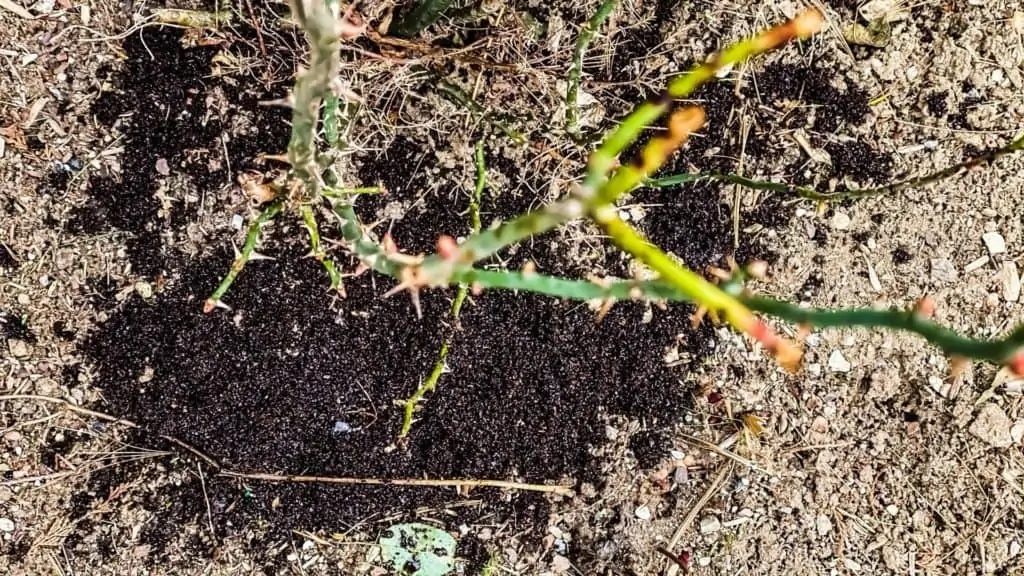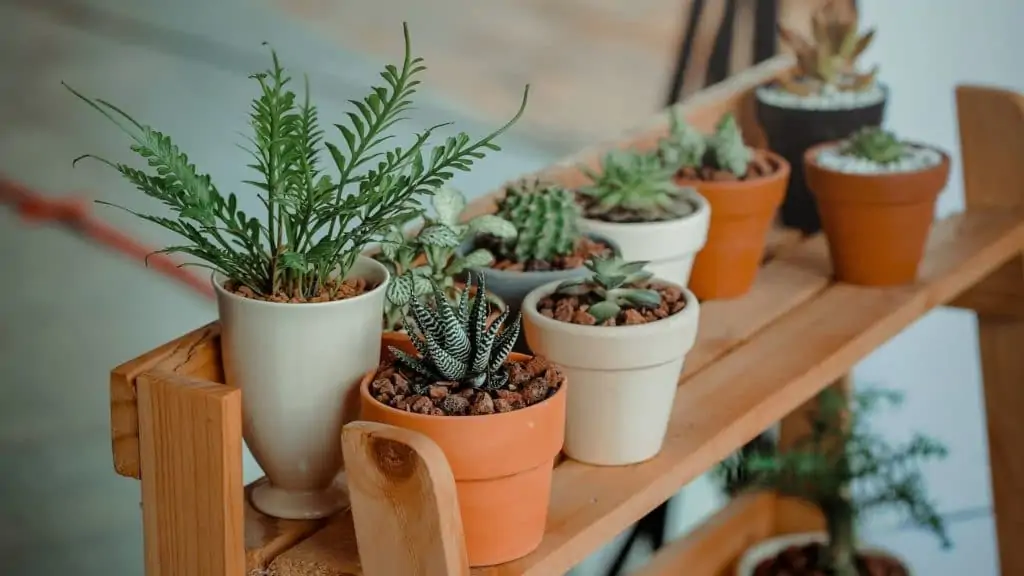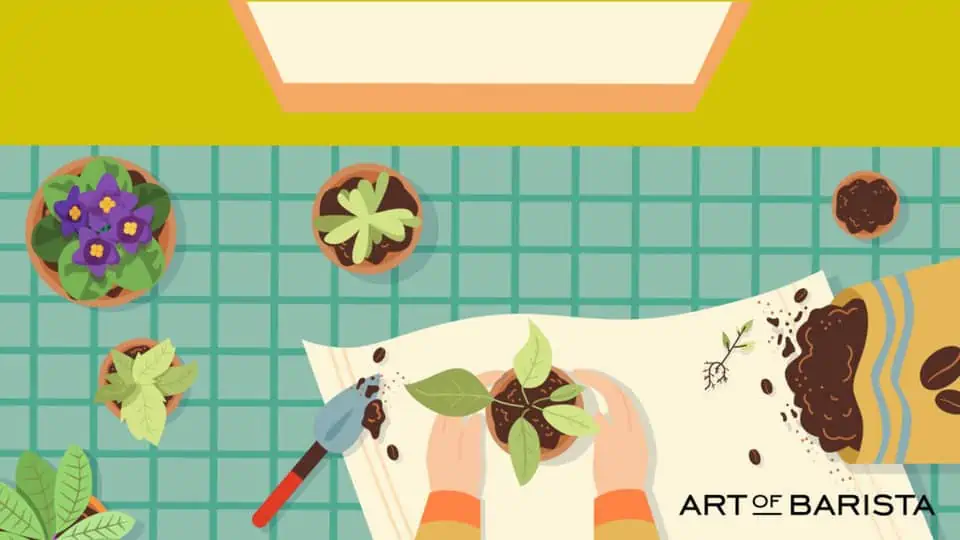If you’re like many people who enjoy making coffee, you may find that you often have used coffee grounds sitting around in the morning, and maybe you’ve wondered if they are a viable option for your plants.
This is especially true if you own a coffee maker with a grinder attached.
The truth is that coffee grounds are often beneficial for plants, thanks to the many nutrients that coffee contains.
However, you need to know that these grounds might not work for all types of plants.
Coffee grounds are wonderful as a fertilizer, but they aren’t the best option for all kinds of plants.
Coffee has more nitrogen than carbon, which will provide certain plants with a lot of energy but won’t be so great for others.
In this article, we’ll take a look at how you can use coffee grounds for your plants, as well as the benefits and downsides of doing so.
Let’s get started!
Can You Use Used Coffee Grounds For Plants?
The short answer is yes!
You can most certainly use used coffee grounds for plants.
Whether you’re using fresh coffee grounds before the brewing process, or used ones, there are benefits to each, and you will have to weigh them against each other to decide which you want to use.
Uses of Coffee Grounds for Plants
Leftover coffee grounds from your morning brew still have potential left in them.
You can add coffee grounds to your compost bin or garden or directly to the soil around your plants as fertilizer to give back nutrients your plants will love.

1. Composting Coffee Grounds
Coffee grounds are a fantastic ingredient for compost, and when used on a compost pile, they can effectively improve soil health and strengthen plants.
As the coffee grounds break down, they release nitrogen, an essential nutrient for plant growth.
Composting with spent coffee grounds also enriches the soil and will improve the condition of your soil long-term.
Different plants react differently to the nutrients found in coffee grounds (more about this below.)
Aside from nitrogen, almost all coffee grounds give back other nutrients such as phosphorus and potassium which plants will love and micronutrients like calcium, magnesium, boron, copper, iron, and zinc.
2. Coffee Grounds as Fertilizer
There are elements in coffee grounds that make them perfect for fertilizer such as the slow release of nitrogen the coffee grounds give as the plants need it rather than all at once and the trace elements they leave behind.
However, as the coffee grounds break down, their acidic nature (5.5 to 6.8 pH) can also filter into the soil, leaving an acidic residue.
Other Uses for Used Coffee Grounds in Gardens
The chemical compounds in coffee make it a fantastic gardening tool.
Whether you have indoor or outdoor plants, you can put your spent grounds to good use.
3. Coffee Grounds as Mulch
Coffee grounds make an excellent mulch for many plants.
Nitrogen plays many roles, but it can help reduce weed growth and feed worms and soil bacteria.
They also help break down organic materials and reduce odor.
All you need to do is spread the grounds around your plants or trees to help maintain your yard, just like you would with a mulch made from grass clippings.
4. Coffee Grounds as a Pesticide
Did you know that you could use your coffee grounds as a pesticide? The same stuff you use to create delicious coffee is also great at keeping pests out of your garden.
According to a study conducted in 2005, the caffeine in coffee beans can help to control mosquito populations by killing the larvae.
This, in turn, could affect insects like ants and wasps.
How Can Coffee Help Your Plants?
Not only can coffee help plants directly, but it’s also perfect for the soil and future plantings.
For both coarse soils and finer, clay-based soils, coffee can help make your garden a richer, more fertile growing area for your plants.
1. Adds Nitrogen to Compost
Coffee grounds are full of nitrogen, four times more nitrogen than most other compost.
This means that coffee is an excellent addition to your growing soil for nitrogen-loving plants.
You can use them just the way you usually would.
The only difference is that the coffee grounds will help your compost pile stay hot and give it a great texture.
2. Improves Soil Drainage
Due to their texture being coarser than most soils, coffee grounds can significantly improve the drainage capacity of clay soils by stretching and improving the overall physical and chemical properties of clay soil.
3. Helps to Aerate the Soil
The larger size of the coffee grounds is a great way to aerate the soil, helping to break up the earth, especially in the finer and denser soils with a lot of clay.
4. Improves Soil Water Retention
For dryer or dustier soils, the grounds’ high water-holding capacity can help trap water and give dry soils a greater moisture content.
5. Can Deter Slugs and Snails from Plants
The acids in coffee grounds keep slugs and snails away, so add a handful when planting to keep your garden safe.
6. Can Act as a Cat Repellant
The best way to keep your cat (or the neighbor’s cat!) away from certain areas is to find a repellent for them, and cats generally don’t like the strong smell of coffee.
Put the safe and non-toxic coffee grounds on the grass, where cats go to the bathroom, and even in other areas where the cat may seek shade and peace, so they keep their distance.
Which Plants Like Coffee Grounds?
Coffee grounds contain many organic compounds – thousands of them – but one of the most abundant is chlorogenic acids.
This is good news for plants that thrive in acidic soil.

Some common acid-thriving garden plant varieties include:
- Broccoli
- Sweet potato
- Radishes
- Carrots
- Berries
- Tomato plants
- Pepper
Do All House Plants Like Coffee Grounds?
Coffee grounds can indeed fertilize your household plants and help them grow, but it’s critical to understand that they can also be harmful to them.
Here are a few house plants that can benefit from coffee grounds:
- Azalea
- Cyclamen
- Snake Plant
- African Violet
- Pothos
- Christmas Cactus
- Philodendrons
- Jade Plants
- Spider Plant
As a general rule of thumb, if your house plant is of a variety that thrives in acidic soil, then you should have no problem giving it coffee grounds!
Can You Put Coffee Grounds on Indoor Plants?
You absolutely can!
Coffee grounds can offer a boost of nutrients to both outdoor and indoor plants.
You can even make your own soil mixed with coffee grounds and other ingredients.
Be sure to choose the right kind of indoor plant for this purpose.
Are Coffee Grounds Good for Flowers?
Yes!
Coffee grounds are good for flowers that enjoy nitrogen-rich, acidic soils.
Some flowers like this include:
- Marigolds
- Daffodils
- Lily of the valley
- Blue hydrangeas
- Azaleas
- Camellias
- Rhododendrons
- Magnolias
Which Plants Do Not Like Coffee Grounds?
You probably won’t be surprised to hear that not all plants do well with coffee grounds.
If too much acidity in the soil would hinder your plants, then you may want to put the coffee grounds elsewhere for now.
Some plants which may not like coffee grounds include:
- Asparagus
- Orchids
- Lavender
- Rosemary
- Black-Eyed Susan
- Ferns
- Devil’s Ivy
Can Coffee Grounds Harm Plants?
In most cases, coffee grounds are a great fertilizer because they are easy to obtain and rich in nutrients that plants love!
However, the grounds will occasionally hurt plants.
1. Can Form a Dense Barrier over Soil
One concern is the tendency for coffee grounds in your garden to form a thick layer over the soil.
Coffee grounds are fine particles that become compact when they dry and may prevent water from entering the plant.
This can lead to root rot.
However, in most cases, the amount of coffee grounds you use is so small that this shouldn’t be a problem.
2. May Be Harmful to Dogs in Large Quantities
Some foods are best left to humans, and coffee is one of them.
Coffee grounds contain caffeine, which, when ingested in significant quantities by dogs, can be toxic and harmful to them.
The side effects of coffee grounds can be stomach and intestinal issues for your dog.
3. Inhibits Seedlings from Growing
Caffeine can make it difficult for young plants to grow as they should, even when mixed into other organic material.
If you have plants that are just starting to grow or have just planted seeds, it is probably best not to use coffee grounds on them just yet.
4. Caffeine Can Suppress Root Growth
Caffeine may also suppress plant root growth, which can be deadly to seedlings.
Skip using coffee grounds on seedlings and reassess when they’ve grown.
5. Antibacterial Properties can Destroy Good Bacteria in Soil
Coffee has antibacterial properties, which is excellent news if you are trying to get rid of harmful bacteria.
However, it also means that coffee can destroy good bacteria in the soil.
Luckily, if you use them in moderation, no more than 10% of the makeup of the fertilizer, you shouldn’t have anything to worry about.
6. May Kill Off Earthworms in Compost
Although coffee grounds may help attract earthworms to your garden, coffee grounds can be toxic to worms and may kill them in high quantities.
To prevent this from happening, remember, once again, to use the grounds in moderation.
How to Use Coffee Grounds for Plants
If you like brewing your own coffee at home, you should know that you can use the leftover coffee grounds to help your plants grow.
Here are some guidelines that will help you do it in a safe and balanced way:
- Use any kind of coffee grounds in your compost, from light to dark roast, and even espresso grounds will be a great addition.
- Aim for a ratio of 10% coffee grounds to 90% shredded leaves and organic matter.
- Reusable coffee brewing cups can be opened and emptied into the compost or sprinkled around plants but used paper coffee filters can be tossed right into the compost.
- Use decaffeinated coffee if you’ll use the grounds around sensitive or young plants.
In Conclusion: Can You Use Coffee Grounds For Plants? Yes.
Coffee grounds are a great thing to use for plants – provided you use them with care and in a balanced way.
They will provide the soil with many nutrients that your plants need, and since they are cheap and readily available, you will probably save money!
Don’t throw your grounds away!

